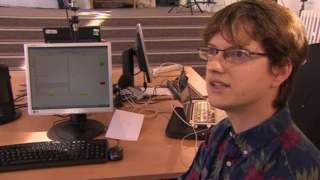Live Reporting
Get Involved
- Send a text to 61124
- Send an email totalkingpoint@bbc.co.uk
- Twitter: Tweet us
- Facebook: Facebook
I'm not a Loebner Prize judge like Rory, but that doesn't mean I can't talk to a bot.
These days lots of chatbots exist online including a version of one of this year's finalists -Mitsuku.
So, I decided to run my own Turing Test and started with a great British conversational opener...
ME: What's the weather like where you are?
MACHINE: Here in Leeds it is quite overcast. I think it will rain later
(Mm - a bit suspicious - not how a human would talk)
ME: Don't put any washing out then
MACHINE : Where should I put it then?
ME: You're a bot aren't you?
Mitsuku
We're now streaming live from Bletchley Park.
To watch click on the Live Coverage link at the top of the page.Viewers in the UK will also be able to see the occasional update on the News Channel.
BBC
Another deep question has been suggested to Rory:
Meanwhile he has dismissed this question:
George:
The only true test of a 'thinking machine' is if it uses inappropriate language and tells its creator/tester to go take a running jump.
I have just arrived.
The tension is mounting. On the train journey I have been bombarded with all sorts of clever questions to ask the bots. I may use some of them. Watch this space...
BBC
So how does it all work?
There will be four judges attempting to decide whether they are chatting online with a human or a bot.
In a room just behind them will be four humans - known as confederates and four chatbots.
The judges will interact with two entities on a screen and must decide which is human and which is the machine.
There are four rounds and after that the judges must rank the entities as to how human-like they were during the conversations.
People are starting to arrive now and later on I'll be interviewing some of the judges and also the human 'confederates' who will be busy typing away in a little room behind us.
But first I spoke to Ed Keedwell, a senior lecturer at the University of Exeter who is running this year's competition. He told me that the hope is to host the prize at Bletchley Park permanently from now on - it has previously been held at different locations around the world. Bletchley seems fitting, he told me, because of its links to UK computer science. I also asked him when he expected an AI to win the ultimate $100,000 prize. "I think it is still a long way off - multiple decades", he said.
Andrew Martin, from Goldsmiths University of London explains how the Loebner Prize will work.
I have been writing a series of articles about artificial intelligence and it is very exciting to see such an exciting test unfold in front of my eyes.
I've got some experts on hand to help guide me through the day - including Nello Cristiani, a professor of artificial intelligence at Bristol University - who will be watching our live feed - and David Levy, a past winner, who is coming along this year to watch.
I will also be interviewing Hugh Loebner who launched the prize 25 years ago.NB the live video feed starts in about 15 minutes, and you can watch it by clicking Live Coverage in the section at the top of the page.
Thinkstock
Tweeters have been suggesting what questions Rory should ask to spot the difference between a bot and a human.
Tweet your questions with the hashtag #IntelligentMachines.
Here's a little promo video Rory made in advance of the event.
We're not sure he's taking it all too seriously.
I'm very excited to be here at Bletchley Park - home of the codebreakers and Alan Turing, one of the first people to consider the possibility that machines could one day think.
At the moment I'm in an empty room next to Hut eight but later it will be filled with people taking part in the Loebner Prize, an iteration of the Turing Test which seeks to find a machine that can fool a human into thinking it is human.
If you want to read more about Turing's work on AI, check out this article by Prof Noel Sharkey from 2012:Alan Turing: The experiment that shaped artificial intelligence
Science Photo Library
The Loebner Prize is based on an idea first proposed by Alan Turing in 1950 - the scientist who had earlier helped crack Germany's Enigma code in World War II.You can read his original paper via this link - but here's a brief explanation of the AI test he proposed:
BBC
Turing was inspired by a parlour game in which an interrogator put questions to a man and woman (A and B) in a separate room who replied with typewritten notes. The aim was to determine which was the man and which was the woman.
BBC
Turing's test replaced the man with a computer running a program designed to deceive the questioner about its true identity. Would the interrogator still be able to determine which was the woman, he wanted to know.
BBC
The idea was that if the person asking the questions could not tell the difference between a human and a machine, the computer would be considered to be thinking and have artificial intelligence.
BBC
Turing did not explicitly say that the interrogator should be told that one of the two respondents was a computer.
But the judges in the Loebner Prize are aware of this.
They have five minutes to ask questions to determine which respondent is a computer and which a person.
Here's a quick video our technology reporter Rory Cellan-Jones sent in explaining what's involved in today's event.
Welcome to the live page for the Loebner prize.
We will be bringing you updates from Bletchley Park where judges are going to see if they can tell which is which between a real person and an artificial intelligence chatbot.
Tweet us using the hashtag #IntelligentMachines.
























No comments:
Post a Comment
Please leave a comment-- or suggestions, particularly of topics and places you'd like to see covered